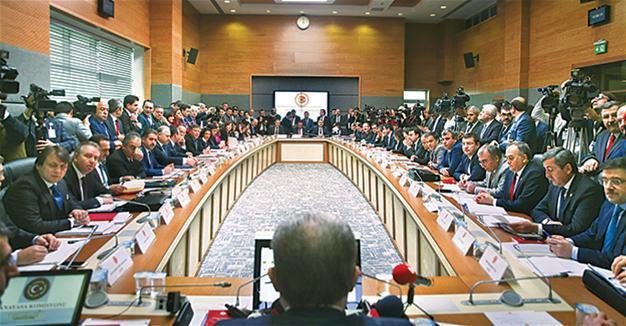Parties meet to ease charter tension
ANKARA

AA photo
Representatives of the ruling and opposition parties met on Dec. 26 to ease tension sparked during the constitutional commission’s work on a charter amendment package that also witnessed a brawl between their lawmakers.Deputy parliamentary group leaders of the Justice and Development Party (AKP), Mehmet Muş; Republican People’s Party (CHP), Özgür Özel; Peoples’ Democratic Party (HDP), Mithat Sancar; and Nationalist Movement Party (MHP), Oktay Öztürk, convened upon the invitation of Mustafa Şentop, head of the constitutional commission.
Şentop invited the AKP and opposition deputy leaders in a bid to ease the tension between the members of the commission, which is discussing amendments proposed by the ruling party for an executive presidential system.
The parliamentary constitution committee resumed on Dec. 26 after a one-day break while slogans and verbal altercations between the members of AKP and CHP interrupted the discussions on the constitutional amendment proposal.
When the brawl erupted between members of the two opposition parties, Şentop gathered the group deputy chairpersons of the political parties to find a way to continue the negotiations.
The panel will continue to discuss the charter for two more weeks, while the charter is expected to be submitted to parliament at the end of January 2017.
While the charter continues to be debated by the panel, Prime Minister Binali Yıldırım was scheduled to meet Nationalist Movement Party (MHP) leader Devlet Bahçeli late on Dec. 26 after the Hürriyet Daily News went to print.
The two leaders were to gather to address expected revisions to be made in the charter amid AKP lawmakers’ concerns about articles substitute parliamentarians and stipulations that presidential candidates must have been born as Turkish citizens.
The leaders are expected to iron out problems with a regulation calling for substitute parliamentarians, according to which the number of substitute deputies to be determined by each party will be 20 percent of the number of deputies determined for a province.
The meeting came after AKP lawmakers raised questions about the charter, arguing that the system foreseen by the amendment had no check and balance system, diminishes the power of parliament and threatens the AKP’s legislative power.
Yıldırım confirmed on Dec. 22 that AKP lawmakers had concerns about the articles which regulate substitute parliamentarians, arguing that the amendment could cause serious altercations and even result in killings.
“Some of our friends have confusions about a few points. The articles will be fixed; we will work on it,” Yıldırım said Dec. 22, adding that the AKP would seek the approval of the MHP group since the proposal was brought to parliament as a result of the joint efforts of the two parties.
The AKP is set to remove the statements “death” and “substitute” from the article, Reuters reported on Dec. 22, while Mustafa Şentop, the chair of the parliament’s constitution committee, indicated a possible amendment as follows: “In the event there is a vacancy in parliament due to dismissal, the vacancy will be filled by lawmakers from the same party even if the parliamentarian has shifted his/her parties during the time when the vacancy emerged.”
















